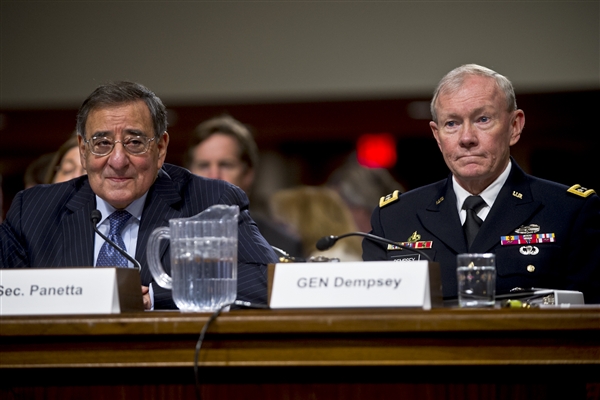
According to today’s news report, the Pentagon has decided to cancel the deployment of the aircraft carrier USS Harry Truman two days before it was scheduled to leave and head to the Persian Gulf. Since 2010, the U.S. has tried to maintain a two carrier presence in the Persian Gulf to counter Iran’s threats to close the Hormuz Strait in the wake of sanctions against their nation. The thinking behind this move seems to be that the Truman needs to be in held in reserve to respond to an unexpected crisis. The Navy is getting short of operationally ready forces.
Chairman of the Joint Chiefs of Staff, General Dempsey stated:
“We’re trying to stretch our readiness out by keeping this particular carrier back at home port in our global response force, so that if something happens elsewhere in the world, we can respond to it,” Dempsey said. “This is the first adjustment in what will be, I think, a series of adjustments across the services as we try to preserve our readiness for as long as possible.”
If you’re wondering what the so what factor is, consider this:
“Speaking before the Senate Armed Services Committee, Panetta said an exhaustive review of the Benghazi events has established the Defense Department responded appropriately to the attacks.
“This was, pure and simple, a problem of distance and time,” he said.
“The interagency response was timely and appropriate, but there simply was not enough time given the speed of the attacks for armed U.S. military assets to have made a difference,” Panetta told the senators, quoting the Accountability Review Board’s findings.”
Benghazi happened before the military was forced to start making drastic cuts that will affect readiness. How well will the military be able to respond to a future crisis? Depending on the location, the answer could be not very well.
Speaking at Georgetown University yesterday, outgoing Defense Secretary stated the following:
“If sequester happens, let me tell you some of the results:
We will furlough as many as 800,000 DOD civilians around the country for up to 22 days. They could face a 20 percent cut in their salary.
You don’t think that’s going to impact on our economy? You don’t think that’s going to impact on jobs? You don’t think that’s going to impact on our ability to recover from the recession?
We’re going to cut back on Army training and maintenance, putting about two-thirds of our active brigade combat teams outside Afghanistan at a reduced readiness level. We’ve got to cut back on their training. We’re going to have to cut back on the ability to support the troops who are not in the war zone. So what happens is we put more stress on those who are in the war zone.
We’re going to have to shrink our global naval operations with a reduction of as much as one-third in our western Pacific naval operations. This whole idea about trying to rebalance will be impacted.
We’ll cut the Air Force flying hours and weapons system maintenance, putting flying units below acceptable readiness standards by the end of the fiscal year.
This is not a game. This is reality. These steps would seriously damage the fragile American economy, and they would degrade our ability to respond to crisis precisely at a time of rising instability across the globe — North Africa to the straits of Hormuz, from Syria to North Korea. We would have no choice but to implement these kinds of measures if Congress fails to carry out its basic responsibility to the American people.”
This brings me to more thoughts and impressions from the West 2013 conference I attended last week. In my last blog, I mentioned that I’d had the opportunity to interview both the head of the Navy and the head of the Marines. Since intelligence plays a major role in warfighter decisions on force size and allocation, I’ll pass on what the Chief of Naval Operations, Admiral Jonathan W. Greenert and Commandant of the Marine Corps, General James F. Amos, had to say about the intelligence support they’re receiving post 9/11. The Admiral made the following points:
General Amos also seemed very pleased with the support the intelligence community was providing. His key points were:
The issue of “push” versus “pull” is interesting. In the past, the communications pipelines of deployed sailors and marines were small and couldn’t handle the huge amount of data the intelligence community collects. As a consequence instead of trying to send all of the data they collected to the deployed forces, the intelligence community provided tailored support. In layman’s terms, that meant, giving them the information you thought they would need in the time and format required for operations. The problem is sometimes you didn’t give them everything they wanted and needed to do their mission. If the deployed forces have the capability and large enough communications pipelines to “pull” the information they need that makes their life a whole lot easier.
Think I’ll end here. In my next blog, I’ll discuss what the Pacific Fleet Commander, Admiral Cecil D. Haney had to say about the conference topic, “Pivot to the Pacific What are the Practical and Global Implications.” Then I’ll comment on the comments his senior intelligence officer made during the conference. As always, my thoughts are my own.